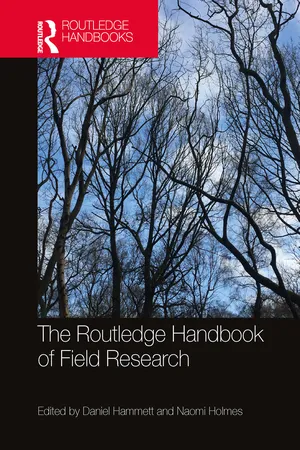
- English
- ePUB (mobile friendly)
- Available on iOS & Android
The Routledge Handbook of Field Research
About this book
The Routledge Handbook of Field Research presents a comprehensive, go-to resource for staff and students in preparing for and thinking about the doing of field research, including both individual fieldwork and group field classes.
Framed by rapidly evolving debates relating to environmental and social justice, decolonialism, the climate crisis, and post-truth society, as well as taking into account ethical, health and safety, and other practical considerations, researchers are faced with a complex and evolving set of factors when making decisions. Working from foundational questions relating to the need for and importance of field research, of where the 'field' is, through logistical and practical concerns, to complex debates around equality and diversity, power relations, sustainability and ethical conundrums, this book is not a simple, formulaic 'how to' guide. Instead, the handbook offers a more critical and reflective approach – acting more as a 'how to start to think critically about' text. In providing a comprehensive and cutting-edge overview of key debates and considerations in the planning, doing, and wrapping up of field research, the handbook shares examples and reflections from experienced field researchers and field class leaders as well as scenarios, debates, and critical questions to help guide field researchers through their research journey. While there is a rapidly expanding array of books on research methods and epistemologies, this handbook offers a unique contribution that addresses distinct gaps in the current literature. Through a strong emphasis on field class and group-based field research, this handbook offers a unique resource to support field class leaders in thinking through the design and doing of field classes, and adopts a pedagogical approach in 'asking difficult questions' of the reader rather than offering 'the answer'. In so doing, we promote a deeper, reflective engagement with the complexities of the research journey.
The Routledge Handbook of Field Research includes contributions from over 50 leading authors, culminating in an essential resource for both experienced field researchers and field class leaders as well as newcomers to lone and group-based field research.
Frequently asked questions
- Essential is ideal for learners and professionals who enjoy exploring a wide range of subjects. Access the Essential Library with 800,000+ trusted titles and best-sellers across business, personal growth, and the humanities. Includes unlimited reading time and Standard Read Aloud voice.
- Complete: Perfect for advanced learners and researchers needing full, unrestricted access. Unlock 1.4M+ books across hundreds of subjects, including academic and specialized titles. The Complete Plan also includes advanced features like Premium Read Aloud and Research Assistant.
Please note we cannot support devices running on iOS 13 and Android 7 or earlier. Learn more about using the app.
Information
Table of contents
- Cover Page
- Half-Title Page
- Title Page
- Copyright Page
- Contents
- List of figures
- List of tables
- List of boxes
- List of contributors
- List of discussants
- Acknowledgements
- 1 Why doing field research well matters
- Part I Shifting Landscapes of Field Research
- Part II Developing Inclusive Field Research
- Part III Planning and Preparing Field Research
- Part IV Negotiating Field Research in Practice
- Part V Field Research Methods in Practice
- Part VI Legacies and Afterlives of Field Research
- Part VII Looking Ahead
- Index